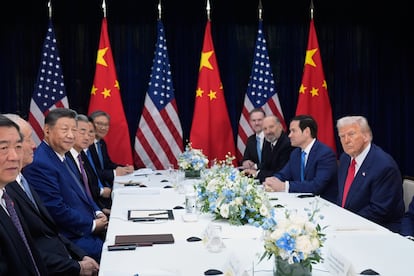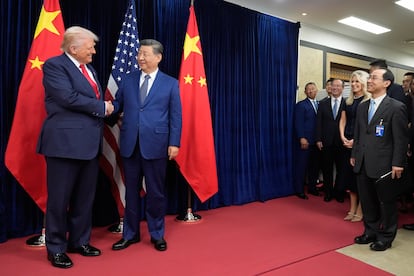Agreement in Busan. US President Donald Trump and his Chinese counterpart, Xi Jinping, finally met face-to-face after months of tensions, and the meeting in the South Korean city of Busan resulted in several agreements, as detailed by the Republican after the meeting, already aboard Air Force One to return to Washington. Trump stated that China has agreed to postpone for one year its restrictions on the export of rare earth elements, one of the main points of contention, and announced, for his part, the immediate reduction from 20% to 10% of the tariffs imposed in February on Chinese goods due to fentanyl trafficking. He also stated that he will visit China in April, and that this country will begin buying large quantities of soybeans, according to several media outlets aboard the presidential flight. Furthermore, according to Trump, they discussed the war in Ukraine:"We're going to work together to see if we can do something," he said.
“I think it was an incredible meeting,” the tycoon summarized. “The whole rare earth issue has been resolved [...] And that's for the world. It was a situation that affected everyone, not just the United States,” he emphasized. “There are no more obstacles.”
The Chinese side has confirmed the agreements from Beijing. A Chinese trade spokesperson explained in a press conference that the United States has agreed to suspend for another year the reciprocal 24% tariffs imposed by Trump on China. These tariffs had already been paused for 90 days in May following a truce between the United States and China, and were extended in August. The pause was set to expire on November 10, but has now been extended for an additional year. Beijing has also committed to suspending for one year any retaliatory measures taken in response to these tariffs.
Washington has also pledged to suspend for one year the expansion of the list of entities subject to export controls, according to the spokesperson. This regulatory change, introduced by Washington in September and potentially affecting thousands of subsidiaries of Chinese companies, had sparked outrage in Beijing: its response was to approve shortly afterward a series of additional restrictions on rare earth elements, which in turn provoked Washington's anger.
Now, the restrictions are in limbo for the next 12 months. “China will suspend the implementation of the corresponding export control measures announced on October 9 for one year and will study the detailed formulation of specific plans,” the Commerce spokesperson stated. Both sides have also committed to pausing, also for one year, the new reciprocal port tariffs introduced a couple of weeks ago. And the Chinese government has stated that consensus has been reached on “anti-drug cooperation regarding fentanyl, the expansion of agricultural trade, and the handling of specific business cases.”

Furthermore, the framework agreement for the sale of the popular Chinese video social network TikTok in the United States has been revived, as agreed in September during a meeting of Chinese and American trade negotiators in Madrid, according to the aforementioned Chinese spokesperson.
The meeting, their first in six years, began around 11:00 a.m. local time (3:00 a.m. in mainland Spain), according to Chinese media, and lasted approximately 100 minutes. “It’s a great honor to be with my friend, a really longtime friend, if you think about it, the very, very distinguished and respected President of China,” Trump remarked, in a flattering and positive tone, at the start of the meeting, according to the White House channel's social media broadcast. “We’re going to have some discussions. We’ve already agreed on many things, and we’ll agree on some more right now. But President Xi is a great leader of a great country, and I think we’re going to have a fantastic relationship for a long time.”
Xi also said it was a pleasure to see each other again. “It’s been many years,” he said at the start of the meeting. He noted that since Trump’s reelection, they had spoken three times by phone, exchanged several letters, and remained in close contact. Thanks to their guidance, relations have remained “stable overall,” he said. “Because of the differences between our two nations, we don’t always agree. It’s normal for the world’s two largest economies to have occasional friction,” the Chinese leader continued. But in the face of challenges, he concluded, the leaders should ensure that relations stay on the right track.
“The recent ups and downs in economic and trade relations between China and the United States have also provided some lessons for both sides,” the Chinese leader said, according to the official reading provided by the Xinhua news agency. He urged them to avoid “falling into a vicious cycle of mutual retaliation.”
Earlier, both leaders posed with broad smiles for photographers in front of their respective countries' flags."We're going to have a very successful meeting," Trump announced after the handshake."But he's a very tough negotiator, that's not good," he added."We know each other well. We have a great relationship." Xi remained silent at his side. At the conclusion of the meeting, in a gesture of goodwill, Trump accompanied his Chinese counterpart to his car. Another handshake and smiles from both sides.
The interview, which began in a friendly tone, was already preceded by that air of cordiality from both sides, who are seeking to ease the battle they are waging on various fronts. This is the first in-person meeting between the leaders since the Republican took office for the second time in January of this year, unleashing a tariff storm between the two powers that reached the level of a de facto trade blockade last spring, dragging down a large part of the global economy.
In the lead-up to the meeting, Xi asserted that China's development does not conflict with Trump's vision of"making America great again." The two countries "can fully complement each other and prosper together," he stated.
The Asian leader also acknowledged Trump's efforts to resolve international conflicts."You care deeply about world peace," he noted."I appreciate your significant contribution to achieving the ceasefire agreement in Gaza." He also recalled that last Sunday, the American president witnessed the signing of a peace declaration on the Cambodian-Thai border. He further stated how China, for its part, has also been fostering dialogue and reconciliation on sensitive issues."Many challenges remain in today's world, and China and the United States can jointly demonstrate the responsibility of great powers."

The meeting, which was on the verge of being canceled in recent weeks, has been made possible largely thanks to the meeting between the negotiating teams from Washington and Beijing, who spent a weekend in intense discussions trying to pave the way for their leaders. “We’re going to have something that will be very, very satisfying for China and for us,” Trump announced Wednesday night during a dinner with South Korean President Lee Jae Myung and other regional leaders on the sidelines of an Asia-Pacific forum. “I think it’s going to be a very good meeting. I’m looking forward to it tomorrow morning,” he added.
After a summer of apparent calm, following a tariff truce reached between Washington and Beijing in May, tensions flared again in October after China deployed a new export control mechanism for rare earth elements, a move that was met with outrage by the White House. Beijing responded with this latest blow to what it perceived as a breach of the non-aggression pact by Washington, after the White House approved, among other measures, an expansion of the list of entities subject to export controls.
The meeting was arranged on the sidelines of the Asia-Pacific Economic Cooperation (APEC) summit, being held in Gyeongju, the ancient medieval capital of Korea. But their confrontation took place at the airport in neighboring Busan, almost like an eclipse: with Trump about to take off to return to the United States and Xi having just landed to attend the summit. Trump, in fact, is skipping the official days of the leaders' forum, which begins on Friday.

